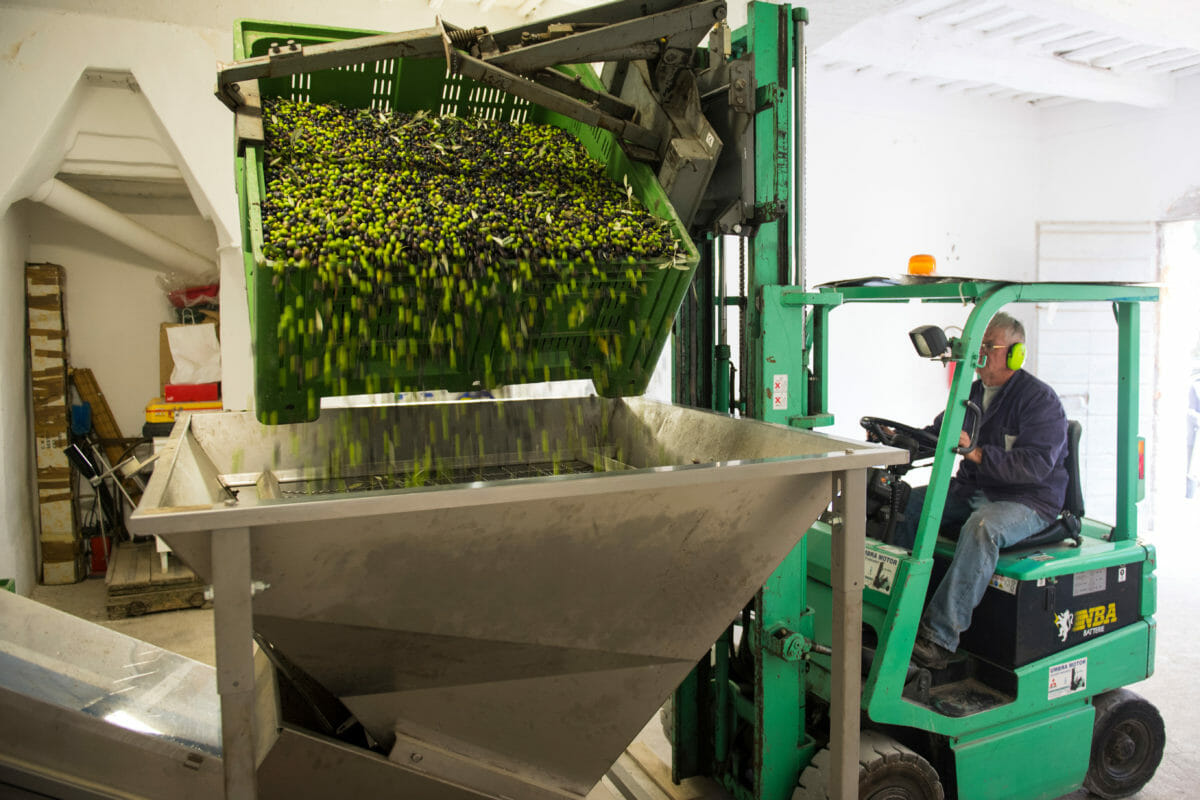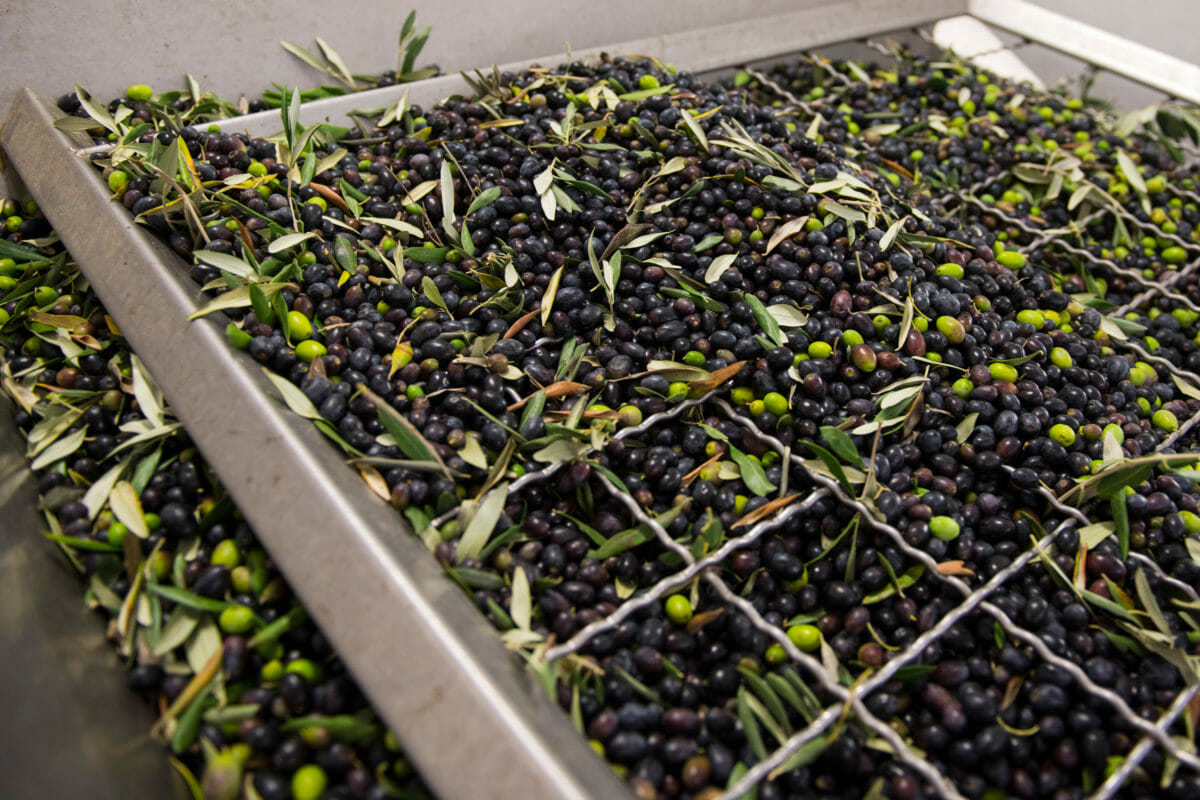Italian Olive Oil Producers Supplement Climate Change Losses Through Biofuel
An Italian farm group estimates droughts cut olive production by 22 percent this year.
Italian Olive Oil Producers Supplement Climate Change Losses Through Biofuel
An Italian farm group estimates droughts cut olive production by 22 percent this year.

A worker processes olives. courtesy of Agriturismo La Montagnola
ROME – In a normal year, olive oil lovers from around the world join farmworkers in Umbria’s rolling hills to wake up at dawn and harvest the green fruit. But in 2020, COVID-19 has kept well-heeled tourists away, while nasty droughts have made the ancient practice of olive picking less predictable. To supplement their income in uncertain times, Italian farmers are getting creative, turning waste from the olive oil harvest into biofuels.
That’s exactly what has helped Vittoria Iraci Borgia of Agriturismo La Montagnola, an extra virgin olive oil estate near Perugia, survive a hard year for many in the industry. Borgia’s team collects a residue from the olive oil extraction process, known as pomace, from more than 30 olive mills throughout Umbria.
“Olive oil is only 10-15 percent of what the olive gives us,” says Borgia, who uses the pomace to generate electricity that powers the buildings on her farm. “The rest becomes a paste—and we can use it as biofuel.”
It’s a process not unlike one used by Marco Lucchi of olive oil producer Lucchi & Guastalli, just outside of Genoa. At a mill on his property, Lucci adds calcium to the pomace paste, using a formula he developed with Unieco, an Italian waste treatment company. The resulting mixture can fuel a biomass plant or be used as compost.
The extra revenue from the olive biomass has helped, Lucchi says, especially during a year in which restaurant closures put a dent in sales.
While Italian olive farmers are hopeful new vaccinations will end their COVID-related troubles, their drought problems are here to stay.
Droughts are now a way of life in Italy. Much of the country seesawed from parched during the summer to drenched, as heavy rain in September and October turned fields green just weeks before olive pressing began. Though hot and dry summers eliminate olive oil flies and other pests, erratic weather also leads to smaller olives or olives falling prematurely.
And then there are the windstorms, which shook trees in Sardinia.
“Producers [in Sardinia] told us they picked 30 percent fewer olives,” said Beatrice Ughi of online Italian gourmet food market, Gustiamo. “They started in mid-October, but there were windstorms of up to 100 kilometers per hour that caused the trees to lose olives. Our partners told us these winds were unheard of.”

Dry spells and erratic weather cost Italian farmers up to two billion euros a year in lost revenue, according to a report by the Euro-Mediterranean Center on Climate Change (CMCC). Italian farm group Coldiretti forecast that the olive oil harvest will decline by 22 percent this year due to the drought. Small farmers worry about what droughts—and lower yields—will mean for the future.
To help them recover, the European Commission recently gave Italy a €211.7 million aid package to repair damage from severe weather events that hit the country in 2019. The funds form part of an ambitious plan announced in July to help EU farms become carbon neutral by 2040.
The Italian government, for its part, passed a decree in March 2018 encouraging the production of biomethane for road transport, said Andrea Marino of Italian olive oil trade group Federolio. After the government set market prices for the end product, olive growers around the country joined programs to feed pomace by itself or in combination with other agricultural waste to aerobic bacteria which then produce biogas, Marino explained.
It’s another way the Italian olive industry can make money while doing its part to battle the very changes in climate that are threatening harvests.
For Borgia, converting olive remains to biofuel is a way to help her neighbors while cutting carbon emissions.
“They are happy to give us this waste,” Borgia noted. “And we are happy to convert it to energy.”
Follow us
This work is licensed under a Creative Commons Attribution-NoDerivatives 4.0 International License.
Want to republish a Modern Farmer story?
We are happy for Modern Farmer stories to be shared, and encourage you to republish our articles for your audience. When doing so, we ask that you follow these guidelines:
Please credit us and our writers
For the author byline, please use “Author Name, Modern Farmer.” At the top of our stories, if on the web, please include this text and link: “This story was originally published by Modern Farmer.”
Please make sure to include a link back to either our home page or the article URL.
At the bottom of the story, please include the following text:
“Modern Farmer is a nonprofit initiative dedicated to raising awareness and catalyzing action at the intersection of food, agriculture, and society. Read more at <link>Modern Farmer</link>.”
Use our widget
We’d like to be able to track our stories, so we ask that if you republish our content, you do so using our widget (located on the left hand side of the article). The HTML code has a built-in tracker that tells us the data and domain where the story was published, as well as view counts.
Check the image requirements
It’s your responsibility to confirm you're licensed to republish images in our articles. Some images, such as those from commercial providers, don't allow their images to be republished without permission or payment. Copyright terms are generally listed in the image caption and attribution. You are welcome to omit our images or substitute with your own. Charts and interactive graphics follow the same rules.
Don’t change too much. Or, ask us first.
Articles must be republished in their entirety. It’s okay to change references to time (“today” to “yesterday”) or location (“Iowa City, IA” to “here”). But please keep everything else the same.
If you feel strongly that a more material edit needs to be made, get in touch with us at [email protected]. We’re happy to discuss it with the original author, but we must have prior approval for changes before publication.
Special cases
Extracts. You may run the first few lines or paragraphs of the article and then say: “Read the full article at Modern Farmer” with a link back to the original article.
Quotes. You may quote authors provided you include a link back to the article URL.
Translations. These require writer approval. To inquire about translation of a Modern Farmer article, contact us at [email protected]
Signed consent / copyright release forms. These are not required, provided you are following these guidelines.
Print. Articles can be republished in print under these same rules, with the exception that you do not need to include the links.
Tag us
When sharing the story on social media, please tag us using the following: - Twitter (@ModFarm) - Facebook (@ModernFarmerMedia) - Instagram (@modfarm)
Use our content respectfully
Modern Farmer is a nonprofit and as such we share our content for free and in good faith in order to reach new audiences. Respectfully,
No selling ads against our stories. It’s okay to put our stories on pages with ads.
Don’t republish our material wholesale, or automatically; you need to select stories to be republished individually.
You have no rights to sell, license, syndicate, or otherwise represent yourself as the authorized owner of our material to any third parties. This means that you cannot actively publish or submit our work for syndication to third party platforms or apps like Apple News or Google News. We understand that publishers cannot fully control when certain third parties automatically summarize or crawl content from publishers’ own sites.
Keep in touch
We want to hear from you if you love Modern Farmer content, have a collaboration idea, or anything else to share. As a nonprofit outlet, we work in service of our community and are always open to comments, feedback, and ideas. Contact us at [email protected].by Michael Scaturro, Modern Farmer
December 26, 2020
Modern Farmer Weekly
Solutions Hub
Innovations, ideas and inspiration. Actionable solutions for a resilient food system.
ExploreShare With Us
We want to hear from Modern Farmer readers who have thoughtful commentary, actionable solutions, or helpful ideas to share.
SubmitNecessary cookies are absolutely essential for the website to function properly. This category only includes cookies that ensures basic functionalities and security features of the website. These cookies do not store any personal information.
Any cookies that may not be particularly necessary for the website to function and are used specifically to collect user personal data via analytics, ads, other embedded contents are termed as non-necessary cookies.